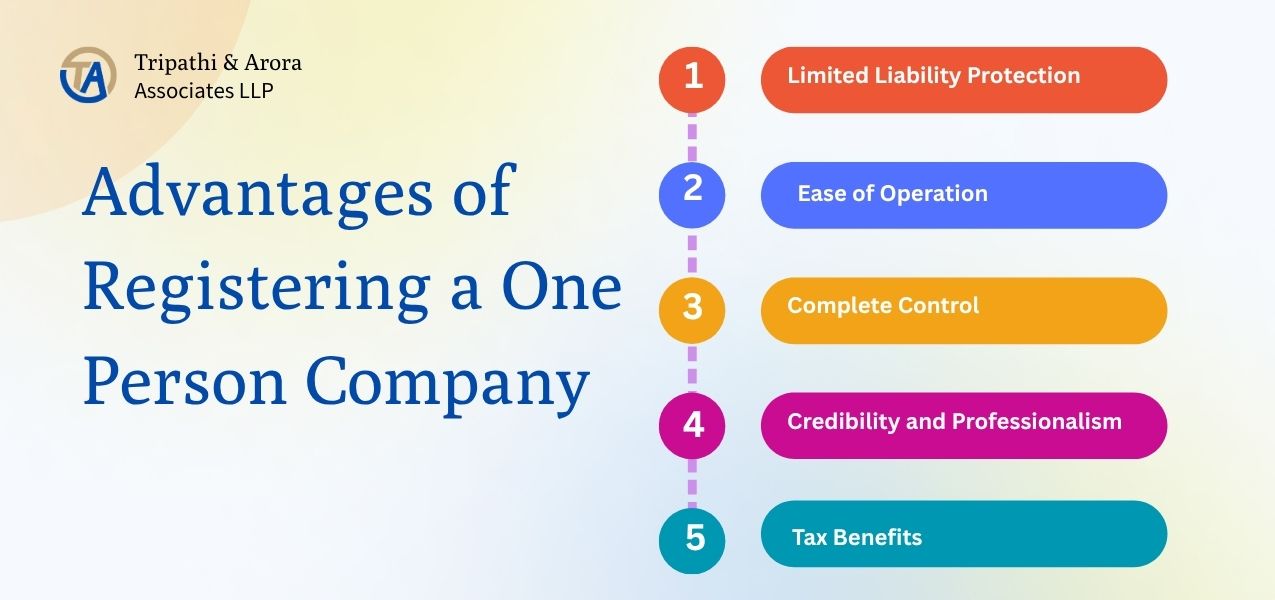One Person Company Registration: A Comprehensive Guide
Posted By: Admin Published: 14-05-2025

- 1. What is a One Person Company (OPC)?
- 2. Advantages of Registering a One Person Company
- 2.1. 1. Limited Liability Protection
- 2.2. 2. Ease of Operation
- 2.3. 3. Complete Control
- 2.4. 4. Credibility and Professionalism
- 2.5. 5. Tax Benefits
- 2.6. 6. Easier Financing Options
- 3. Eligibility Criteria for One Person Company Registration
- 4. The One Person Company Registration Process
- 4.1. Step 1: Obtain Digital Signature Certificate (DSC)
- 4.2. Step 2: Obtain Director Identification Number (DIN)
- 4.3. Step 3: Choose a Unique Name for the OPC
- 4.4. Step 4: Prepare the Required Documents
- 4.5. Step 5: File the Incorporation Application
- 4.6. Step 6: Pay the Registration Fees
- 4.7. Step 7: Certificate of Incorporation
- 5. Required Documentation for One Person Company Registration
- 6. Common Challenges in One Person Company Registration
- 7. How Tripathi & Arora Associates Can Assist You
- 7.1. 1. Consultation Services
- 7.2. 2. Document Preparation
- 7.3. 3. Online Application Filing
- 7.4. 4. Liaison with Authorities
- 7.5. 5. Ongoing Compliance Support
- 8. Conclusion
- 9. FAQ: One Person Company Registration
- 9.1. 1. What is a One Person Company?
- 9.2. 2. Who can register an OPC?
- 9.3. 3. What are the benefits of registering an OPC?
- 9.4. 4. What is the process for registering an OPC?
- 9.5. 5. What documents are required for OPC registration?
- 9.6. 6. How long does the registration process take?
- 9.7. 7. Can a foreign national register an OPC in India?
- 9.8. 8. What are the compliance requirements for an OPC?
- 9.9. 9. How can Tripathi & Arora Associates assist with OPC registration?
- 9.10. 10. Is an OPC suitable for all types of businesses?
- 10. Other Related Links
In recent years, the concept of a One Person Company (OPC) has gained significant traction among entrepreneurs in India. Introduced under the Companies Act, 2013, OPC allows a single individual to operate a company with limited liability, combining the benefits of a sole proprietorship and a corporation.
This structure is particularly appealing to small business owners and startups seeking to formalize their operations while minimizing personal risk. Tripathi & Arora Associates specializes in guiding individuals through the OPC registration process, ensuring compliance with legal requirements and providing tailored solutions.
This comprehensive guide will cover the advantages of an OPC, the registration process, required documentation, and how Tripathi & Arora Associates can assist you in setting up your One Person Company.
What is a One Person Company (OPC)?
A One Person Company (OPC) is a type of company that can be formed with just one person as its member. This structure offers the benefits of limited liability protection while allowing the owner to have complete control over the business. The OPC framework is designed for entrepreneurs who want to operate in a corporate format without the need for multiple shareholders.Key Features of an OPC
- Single Member: An OPC can have only one person as its shareholder, making it ideal for solo entrepreneurs.
- Limited Liability: The liability of the owner is limited to their share capital, protecting personal assets from business liabilities.
- Separate Legal Entity: An OPC is a separate legal entity, distinct from its owner, allowing it to enter contracts, own assets, and incur liabilities in its name.
- Flexible Management: The sole member can also be the director, providing complete control over the company’s operations.
- Less Compliance Burden: Compared to private limited companies, OPCs have fewer compliance requirements, making them easier to manage.
Advantages of Registering a One Person Company

1. Limited Liability Protection
The primary advantage of an OPC is the limited liability protection it offers to the owner. This means that the owner's personal assets are safeguarded from the company's debts and liabilities, reducing financial risk.2. Ease of Operation
OPCs have simplified compliance requirements compared to traditional companies. This makes it easier for entrepreneurs to manage their business without getting bogged down by extensive regulations.3. Complete Control
As the sole member of an OPC, the owner retains complete control over the company’s operations and decision-making processes, allowing for quick and efficient management.4. Credibility and Professionalism
Registering as an OPC enhances the business's credibility, making it more attractive to customers, suppliers, and potential investors. It establishes a formal structure that signifies professionalism.5. Tax Benefits
OPCs are eligible for various tax benefits and incentives available to companies, such as lower tax rates and deductions, which can enhance profitability.6. Easier Financing Options
An OPC can raise funds through equity and loans more easily than a sole proprietorship, as it is recognized as a separate legal entity.Eligibility Criteria for One Person Company Registration
To register an OPC, the following eligibility criteria must be met:- Single Member: The company can have only one member who is a natural person (an individual, not a corporate entity).
- Resident of India: The sole member must be a resident of India, which is defined as someone who has lived in India for at least 182 days during the preceding financial year.
- Unique Name: The proposed name of the OPC must be unique and not similar to any existing company or registered trademark.
- Registered Office: The OPC must have a registered office address in India.
The One Person Company Registration Process

Step 1: Obtain Digital Signature Certificate (DSC)
Overview
A Digital Signature Certificate (DSC) is mandatory for submitting electronic documents and forms to the Ministry of Corporate Affairs (MCA).Steps
- Choose a Certifying Authority: Select a government-approved certifying authority to obtain a DSC.
- Submit Application: Fill out the application form and provide identity and address proof.
- Receive DSC: Once verified, you will receive your DSC, which can be used for signing documents electronically.
Step 2: Obtain Director Identification Number (DIN)
Overview
A Director Identification Number (DIN) is required for the sole member who will act as the director of the OPC.Steps
- Apply for DIN: You can apply for DIN while filing the incorporation form (SPICe) or separately.
- Submit Documents: Provide necessary documents, including identity and address proof.
- Receive DIN: Once approved, you will receive your DIN.
Step 3: Choose a Unique Name for the OPC
Overview
The name of the OPC must be unique and comply with the naming guidelines set by the MCA.Steps
- Check Name Availability: Use the MCA portal to check if your desired name is available.
- Reserve the Name: You can reserve the name by filing Form SPICe+ (Part A) for name reservation.
Step 4: Prepare the Required Documents
Overview
Several documents must be prepared and submitted for the registration of an OPC.Key Documents
- Memorandum of Association (MoA): This document outlines the company’s objectives and scope of operations.
- Articles of Association (AoA): This document details the rules and regulations governing the company’s internal management.
- Identity Proof: PAN card, Aadhaar card, or passport of the sole member.
- Address Proof: Utility bill, rental agreement, or property documents of the registered office.
- NOC from the Owner: A No Objection Certificate from the owner of the registered office premises, if applicable.
Step 5: File the Incorporation Application
Overview
The incorporation application is filed with the MCA to officially register the OPC.Steps
- Fill Form SPICe: Use the SPICe (Simplified Proforma for Incorporating Company Electronically) form to apply for incorporation.
- Attach Documents: Attach the required documents, including MoA, AoA, identity proof, address proof, and NOC.
- Submit the Application: Submit the application through the MCA portal using your DSC.
Step 6: Pay the Registration Fees
Overview
The registration fees for an OPC depend on the authorized capital and can be paid online through the MCA portal.Step 7: Certificate of Incorporation
Overview
Once the application is processed and approved, you will receive a Certificate of Incorporation.Steps
- Receive Certificate: The Certificate of Incorporation serves as legal proof of the existence of your One Person Company.
- PAN and TAN: A PAN (Permanent Account Number) and TAN (Tax Deduction and Collection Account Number) will also be issued automatically.
Required Documentation for One Person Company Registration
To successfully register an OPC, you will need to prepare and submit the following documents:- Digital Signature Certificate (DSC): For the sole member.
- Director Identification Number (DIN): For the sole member/director.
- Memorandum of Association (MoA): Stating the company's objectives.
- Articles of Association (AoA): Governing rules for the company's operations.
- Identity Proof: PAN card, Aadhaar card, passport, etc.
- Address Proof: Utility bills, rental agreements, or property documents.
- No Objection Certificate (NOC): From the owner of the registered office premises, if applicable.
Common Challenges in One Person Company Registration
- Incomplete Documentation: Missing or incorrect documents can lead to delays or rejection of the application.
- Name Availability Issues: Choosing a name that is already registered can result in complications.
- Technical Glitches: Users may encounter technical issues while navigating the MCA portal.
- Understanding Compliance Requirements: Many entrepreneurs find it challenging to navigate the compliance requirements associated with running an OPC.
How Tripathi & Arora Associates Can Assist You
Tripathi & Arora Associates offers expert guidance and comprehensive services for One Person Company registration. Here’s how we can help:1. Consultation Services
Our team provides consultations to help you understand the benefits of registering an OPC and guide you through the entire process.2. Document Preparation
We assist in preparing and organizing all necessary documents, ensuring that your application is complete and accurate.3. Online Application Filing
Our experts handle the entire online application process, from obtaining DSC and DIN to filing the incorporation application.4. Liaison with Authorities
We liaise with the Ministry of Corporate Affairs on your behalf, addressing any queries or concerns that may arise during the registration process.5. Ongoing Compliance Support
After registration, we provide ongoing support to help you comply with the legal requirements of running an OPC, including filing annual returns and maintaining records.
Conclusion
Registering a One Person Company (OPC) is a strategic decision for entrepreneurs looking to formalize their business operations while enjoying the benefits of limited liability protection. Understanding the registration process, required documentation, and compliance obligations is crucial for a successful launch. Tripathi & Arora Associates is dedicated to providing expert guidance and support to help you navigate the complexities of OPC registration.By partnering with us, you can focus on your core business activities while we handle the intricacies of the registration process and ongoing compliance. Contact us today to learn more about how we can assist you in establishing your One Person Company and achieving your business goals.
FAQ: One Person Company Registration
1. What is a One Person Company?
A One Person Company (OPC) is a company that can be formed with a single member, providing limited liability protection while allowing full control over the business.2. Who can register an OPC?
Any individual who is a resident of India and meets the eligibility criteria can register an OPC.3. What are the benefits of registering an OPC?
Benefits include limited liability protection, ease of operation, complete control, enhanced credibility, tax benefits, and easier financing options.4. What is the process for registering an OPC?
The process involves obtaining a Digital Signature Certificate (DSC), Director Identification Number (DIN), choosing a unique name, preparing documents, filing the incorporation application, and receiving a Certificate of Incorporation.5. What documents are required for OPC registration?
Documents required include DSC, DIN, Memorandum of Association (MoA), Articles of Association (AoA), identity proof, address proof, and No Objection Certificate (NOC).6. How long does the registration process take?
The registration process typically takes 7 to 15 days, depending on the completeness of the application and processing by the authorities.7. Can a foreign national register an OPC in India?
No, only Indian residents can register an OPC as per the current regulations.8. What are the compliance requirements for an OPC?
Compliance requirements include maintaining statutory records, filing annual returns, holding meetings, and complying with tax obligations.9. How can Tripathi & Arora Associates assist with OPC registration?
We provide consultation, document preparation, online application filing, liaison with authorities, and ongoing compliance support.10. Is an OPC suitable for all types of businesses?
An OPC is suitable for small businesses and startups where the owner wants to limit their liability while retaining control. However, businesses with significant funding needs may consider other structures like private limited companies.Other Related Links
- Incorporation Service
- Private Limited Company Registration
- Limited Liability Partnership Company Registration
- One Person Company Registration
- Partnership Company Registration
- Trademark Registration Service
- Income Tax Return Filing Services
- GST Return Filing Services
- FEMA/FDI Services
- Business Registration Solutions
- Accounting And Taxation Services
- Virtual CFO Services
- Secreterial Compliances Services
- Drafting Services

